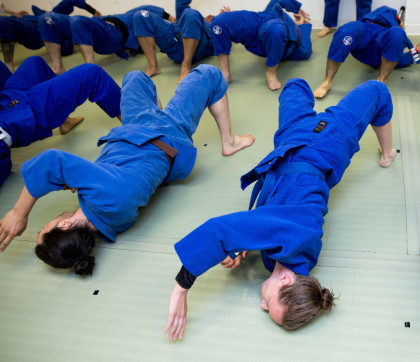It is really important that we find our threshold. As a human being, where is it that we want to quit? What’s our breaking point?
As a twelve year old, I went to a camp for poor inner city kids. It’s was a free camp and I was away the whole summer. While I was there, we went on a canoeing trip through the Adirondack Lakes. We were out there for two weeks and during that trip I found my breaking point as a twelve year old. I never forgot it. Actually I’m still embarrassed by it.
I remember it was raining and we had to do the longest portage of the entire trip – my partner and I had to carry a canoe for two miles. And as one of the biggest kids, I was expected to drop my canoe off and then go back and get another one. I can remember being flooded with feelings of impossibility and frustration, so I ditched the second trip. I made up an excuse because I was at my threshold. I was at my breaking point.
I believed in my heart of hearts that at that moment, I just couldn’t go any further. And as withering as it is when I look back on it, as an adult right nowit gives me a very interesting perspective when I consider other areas of my life where I think I can’t go any further.

We have to take action as a way to find out what our upper limits are.
In truth, I probably could have done that trip five or six more times but I didn’t have a self-concept that would allow me to do it. I had no way to understand getting past my threshold. And one of the interesting things about Jiu-Jitsu and the Martial Arts is it allows us to identify our threshold and then gives us the tools to extend it. We can continually reset our breaking point. The process gives you a clear view of who you are and what you’re capable of on the mat at any given time.
One of the other things that Jiu-Jitsu teaches us is that this threshold is not a fixed point. We can train – that is, practice daily – to push the limit in that way. But there is a catch.
The paradox is that we can’t push our limits unless we are willing to look at our weaknesses. We can only extend by putting ourselves really behind – getting with someone that’s much bigger than us, training with someone that’s much more advanced than us and just putting ourselves in the fire time and time again until suddenly we go from iron to steel. When that happens, we really push our threshold into a new place, we know ourselves as a different person.
Jiu-Jitsu allows us to identify our threshold and then gives us the tools to extend it.
We’ve structured the classroom culture to allow a student to do this on purpose (read about it here). To safely examine our weakest areas without fear of being dismembered in the process by someone with a violent agenda.
It’s like a Zen koan or a riddle. There is no way to “logic” it out, to carefully weigh every option and then slowly, slowly come to a conclusion. You have to take action as a way of finding your breaking point, your upper limits. We can’t be paralyzed with self-doubt. And we don’t have to have the fear of a twelve-year-old that we won’t be able to make it back to camp or that we will collapse under the weight of the burden.
That’s important because now, more than ever, the world is changing. It’s much more complicated, it’s much more aggressive, it’s much more threatening in a lot of ways. It seems like there’s less time, more stress, strange chemicals in the air and the water and our bodies. We have to all be on the same page if we want to make it work. Our decisions are becoming more important to the world, so we need to be willing to push our threshold in a safe and secure environment in order to stay effective and current.
It’s not enough to do this when we’re eighteen or twenty four years old, but we’ve got to be willing to do it when we are 44 years old or 64 years old. Our threshold needs to be pushed throughout our entire lifetime.
For more information about the collaborative training environment at Brooklyn Brazilian Jiu-Jitsu, please visit our website and blog.